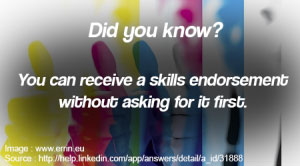
Special to Online Career Tips
If you have logged into LinkedIn, the popular business networking site, over the past few months, you may have been asked to endorse some of your connections’ skills. Or perhaps you have gotten email notification that a connection has endorsed your skills. So what does this all of this mean, and how does this differ from a LinkedIn recommendation? Here are some tips:
What is a skill endorsement?
LinkedIn describes a skill endorsement as being “a great way to recognize your 1st-degree connections’ skills and expertise with one click.” The endorsements can also be reciprocal in that they “let your connections validate the strengths found on your own profile.” The site claims that “skill endorsements are a simple and effective way of building your professional brand and engaging your network.”
Here is what that means for you: take a look at the skills & expertise section of your LinkedIn page. LinkedIn may have come up with your skills by pulling keywords to your profile. Or you can add skills to your profile on your own. At any rate, the more people endorse you for a skill, the more of an expert you can look to be. It is a quick shorthand for seeing what other people consider to be valuable in a LinkedIn connection.
I have written a blog since 2006, so the top-ranked skill I have on my profile is blogging. Other skills that I have been endorsed for include SEO, WordPress, and writing.
Why should I endorse others’ skills?
You cannot ask for others to endorse your skills and expertise, but if you endorse others’ skills, they will see that you did via an email from LinkedIn and via their photo appearing on your profile. It is also the right thing to do, if you believe that the person has good skills in a particular field.
Another way you might have the opportunity to endorse other people’s skills and expertise, aside from visiting that person’s profile, is when you log into LinkedIn. You may be asked a question as to whether a connection has skills at a specific thing, like writing, editing, project management, or some other skill. If you agree and click the item, you are endorsing that person’s skill, and they will receive a note telling them so.
Needless to say, do not endorse a skill that you do not believe the person has, or that they are not very good at. On the other hand, if you feel that somebody has additional skills that are not on the profile, you can suggest some skills for their profile. They can add the skills to their LinkedIn profile if they agree with your assessment.
What is the difference between LinkedIn skill endorsements and recommendations?
They are not the same thing. You can ask for, or be asked for a recommendation – a written endorsement describing your or their work – from a supervisor, colleague, or subordinate. You can also write one up without them requesting it. A LinkedIn recommendation is still more valuable than a skill endorsement, because it is more like a traditional letter of recommendation than the quick thumbs up that a skill endorsement is.
If you are not sure what your skills are, you can ask friends or co-workers, or talk to a career coach about your skills. To learn more about what a career coach does, click here. Another option is to look at a LinkedIn profile of somebody in a similar career to you, and see what skills they have listed.
One other note about LinkedIn skill endorsements — if you do not want them on your profile, you can hide individual ones, or people given them to you, from your profile. However, at this time, you cannot completely opt-out of skill endorsements, so you may want to spend a little time on them to make sure they show you in the best light.
Comments are closed.